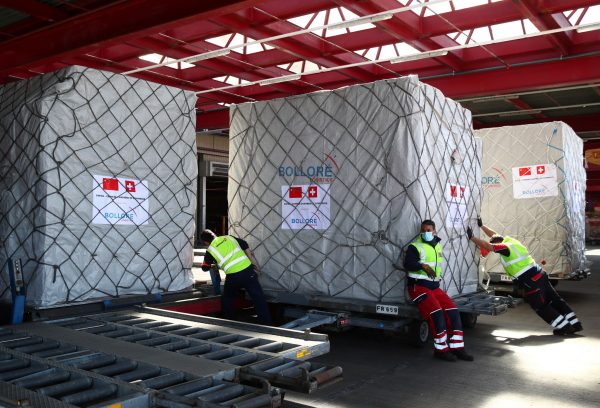The pandemic has had devastating effects on the health, well-being and livelihoods of millions of people. Over 36 million cases have been recorded, over one million people have died and 90 per cent of healthcare systems have been disrupted. The global economy could contract by US$7 trillion in 2020, with the equivalent of around 480 million jobs lost and millions of businesses threatened with insolvency. Creating greater resilience to pandemics and other systemic risks should be a first-order priority.
The call for greater resilience has focused on global supply chains. In the early days of the pandemic, shortages were real and painful. Supply chains depending on single sources or locations for medical equipment, parts and raw materials suddenly appeared more fragile than efficient. Many companies faced fluctuating supply and demand dynamics, rapidly changing purchasing patterns and a flurry of uncoordinated government measures.
But public debate on supply chain resilience has largely focused on one side of the ledger. COVID-19 indeed exposed serious vulnerabilities, but that should not automatically lead to the conclusion that global supply chains are systemically fragile or that vulnerabilities require correction by governments.
Policymakers should recognise that many companies quickly pivoted to provide essential goods and services in support of public health efforts. Most notably, alcohol companies produced hand sanitiser, textiles manufacturers made masks and hotels become quarantine centres. Express delivery services ensured door-to-door supply of essential goods such as medical equipment, medicine and food at the height of the crisis. That they did this while working from home during the greatest economic shock in a century suggests more robustness than fragility.
Largely acting in their own self-interest, companies all over the world have also created greater resilience by seeking greater visibility of the whole supply chain, diversifying sources of supply, rebalancing stock levels and adopting strategies that respond to shifting consumer demand. Achieving systemic resilience can only occur if businesses are given the freedom to respond to the new situation and thoughtfully manage their own risks.
‘Supply chain fragility’ has been occasionally disingenuously invoked or hyped-up to cover for governmental failures. Inadequate stockpiles of masks, medicines and ventilators cannot reasonably be described as failures of corporate supply chains — they were failures of government planning. Similarly, citizens being unable to buy medicines or food from abroad because of export restrictions can only plausibly be attributed to government policymaking. Such misdiagnoses will only lead to poor policy prescriptions.
Policymakers must consider the potential negative side effects of any interventions. This is no easy task. For instance, the average automobile contains around 30,000 parts, with some parts crossing multiple borders and continents before assembly. The complexity of global supply chains makes it difficult to determine how government interventions would affect businesses, workers and consumers.
Far from creating resilience, nativist policies aimed at concentrating industries in one place — ‘reshoring’ or ‘regionalising’ supply chains — would likely undercut competitiveness, raise consumer prices and render entire industries more vulnerable to smaller, localised and more frequent shocks like floods, blackouts or social upheaval. For many companies, the greatest threat to their supply chains now comes not from COVID-19 but from traditional protectionism.
Looking ahead, governments must work hand-in-hand with the private sector to pre-emptively deal with the challenges for vaccine supply chains in what will be an immensely complex logistical operation. Ensuring access worldwide will be complicated owing to shrinking capacity on container ships and cargo aircraft, potentially insufficient amounts of equipment like vials and syringes, and the need to continually refrigerate vaccines throughout the entire cold chain. The logistical challenges increase when delivering to remote communities and countries with poor infrastructure.
Governments must not exacerbate the challenges by interfering with supply chains or adopting nation-first approaches. Imposing export restrictions on vaccines, their chemical components and medical devices, or buying up stocks to inoculate domestic populations would only prolong the pandemic and amplify the economic shock.
While many governments are entering into advance purchase agreements with vaccine producers, they must ensure that such bilateral deals do not skew distribution or undermine critical multilateral efforts to vaccinate the broader global population. Prioritising quickly and exclusively vaccinating one’s own population misses the point that no country will be safe and prosperous until the pandemic is under control everywhere, and would prompt hostility, resentment and possibly retaliation.
Governments should adopt a broader view of their national interests and give their full political and financial commitment to the COVAX Facility. This vaccine pooling mechanism, if fully funded, would ensure vaccines are distributed to healthcare workers and the most vulnerable populations by the end of 2021. Only such international cooperation can ensure the global, rational and fair distribution of vaccines required to take the sting out of the pandemic and drive an economic recovery.
John WH Denton AO is Secretary General of the International Chamber of Commerce (ICC), Paris.
Damien Bruckard is Deputy Director (Trade and Investment) at the ICC.
This article is part of an EAF special feature series on the novel coronavirus crisis and its impact.

